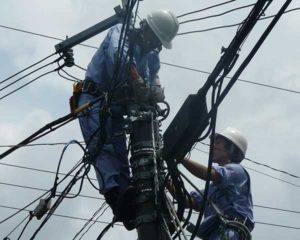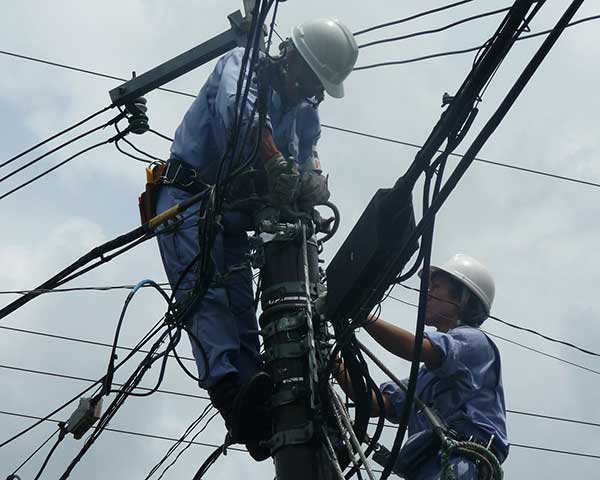Disclaimer: The information on our website is provided for general information purposes only. We make no representations or warranties of any kind, express or implied, about the completeness, accuracy, reliability, suitability or availability with respect to the website or the information contained on our website for any purpose. Any reliance on such information is therefore strictly at your own risk and we are not liable for any damages or losses arising out of or resulting from your reliance on any information contained on our website.
Line installers (also called linesman) play a crucial role in maintaining and repairing the infrastructure essential for electricity and telecommunications. Their job requires technical expertise, physical endurance, and a strong commitment to safety. The path to becoming a line installer and repairer involves specialized training and education, and offers opportunities for advancement in a challenging yet rewarding field.
How to Become a Line Installer

Line installers and repairers typically need a high school diploma or the equivalent. Most employers also require technical instruction and long-term on-the-job training. Apprenticeship programs are common. Additionally, community colleges may offer courses in electronics, telecommunications, and electricity that can also be helpful. Local companies often sometimes work with students to offer 1-year certificates that give hands-on fieldwork.
There are also advanced 2-year associate’s degree programs to provide a broader knowledge of technology in electrical utilities and telecommunications. Additionally, a technical background in electricity or electronics from military service or vocational programs is useful. Apprenticeship or employer training programs can last up to 3 years combining technical instruction with on-the-job training. Though not necessary, certification is available through several associations.
Necessary Skills
Outside of technical training, line installers must be comfortable to work at great heights. Additionally, this job can be physically demanding, so having the physical stamina and strength to perform ones duties is also necessary. As these professionals work in teams, they must also be good communicators and conscious of safety so no one on their crew is hurt.
What does a Line Installer do?
A career as a linesman offers a variety of benefits that extend beyond a stable income. This career field provides a sense of accomplishment as it plays a critical role in ensuring the smooth functioning of essential utilities. Additionally, the physical aspect of the work promotes fitness and active lifestyle. In fact, they often are working outdoors so many find it a benefit as they do not have to work in an office.
Linesmen may also often have the opportunity for overtime work, leading to increased earning potential. Moreover, this career path doesn’t necessarily require a four-year college degree, making it a career that one can attain in a quicker amount of time. The job also entails a dynamic work environment, ideal for those who prefer working outdoors and tackling hands-on tasks, providing a refreshing alternative to desk-bound professions.
Job Description of a Line Installer
Line installers and repairers frequently work in teams to repair or install a complex network of power lines and cables such as telecommunications cables to include fiber optics and electrical power systems. Their job is considered highly hazardous because they work with high-voltage electricity and climb great heights which is why training is so important. The duties of an electrical power line installer and repairer usually include the installation, maintenance, and repairs of power lines that move electricity. Additionally, they must test and inspect auxiliary equipment and power lines. They are also responsible for finding any defective devices, switches, voltage regulators, and transformers.
Line installers climb poles and transmission towers while using truck-mounted buckets to reach equipment. They need to operate power equipment when installing or repairing lines, poles, and towers. Telecommunication line installers and repairers install, maintain, and repair telecommunications equipment.
Telecommunications installers and repairers operate power equipment and drive work vehicles to job sites. He or she sets up service to customers. The duties of line installers and repairers may differ depending on the specific job description they carry.
Career Video Transcript
Electricity, telephone, cable TV, Internet. The communication lines that support access to these modern essentials are in constant use. Line installers and repairers maintain the power systems and cables needed to keep access flowing. The power grid is the network of power lines that moves electricity from generating plants to customers. Electrical power-line installers and repairers install and maintain the power grid.
Telecommunications line installers and repairers work on the lines and cables used by network communications companies. Line installers dig underground trenches and erect poles and towers to install new cable. They use construction equipment, such as trucks equipped with augers and cranes, to dig holes and set poles in place. Line repairers replace old equipment and maintain existing lines. The work can be physically demanding. Work is often performed at great heights or in confined spaces, and outdoors under challenging weather conditions.
Workers need good balance, and the strength to climb utility poles and transmission towers. Lineworkers maintain strict safety procedures, as they encounter hazards such as falls, high-voltages or dangerous gases, which make the occupation among the most dangerous. Although most work regular full-time business hours, some must work evenings and weekends. Some workers travel to maintain a large region. In emergencies workers may have to work long hours for several days in a row. Most entry-level positions require a high school diploma or equivalent; line installers and repairers receive long-term on-the-job training to become fully proficient.
Article Citations
Bureau of Labor Statistics, U.S. Department of Labor, Occupational Outlook Handbook, Line Installers and Repairers.
National Center for O*NET Development. 49-9052.00. O*NET OnLine.
The career video is in the public domain from the U. S. Department of Labor, Employment and Training Administration.

